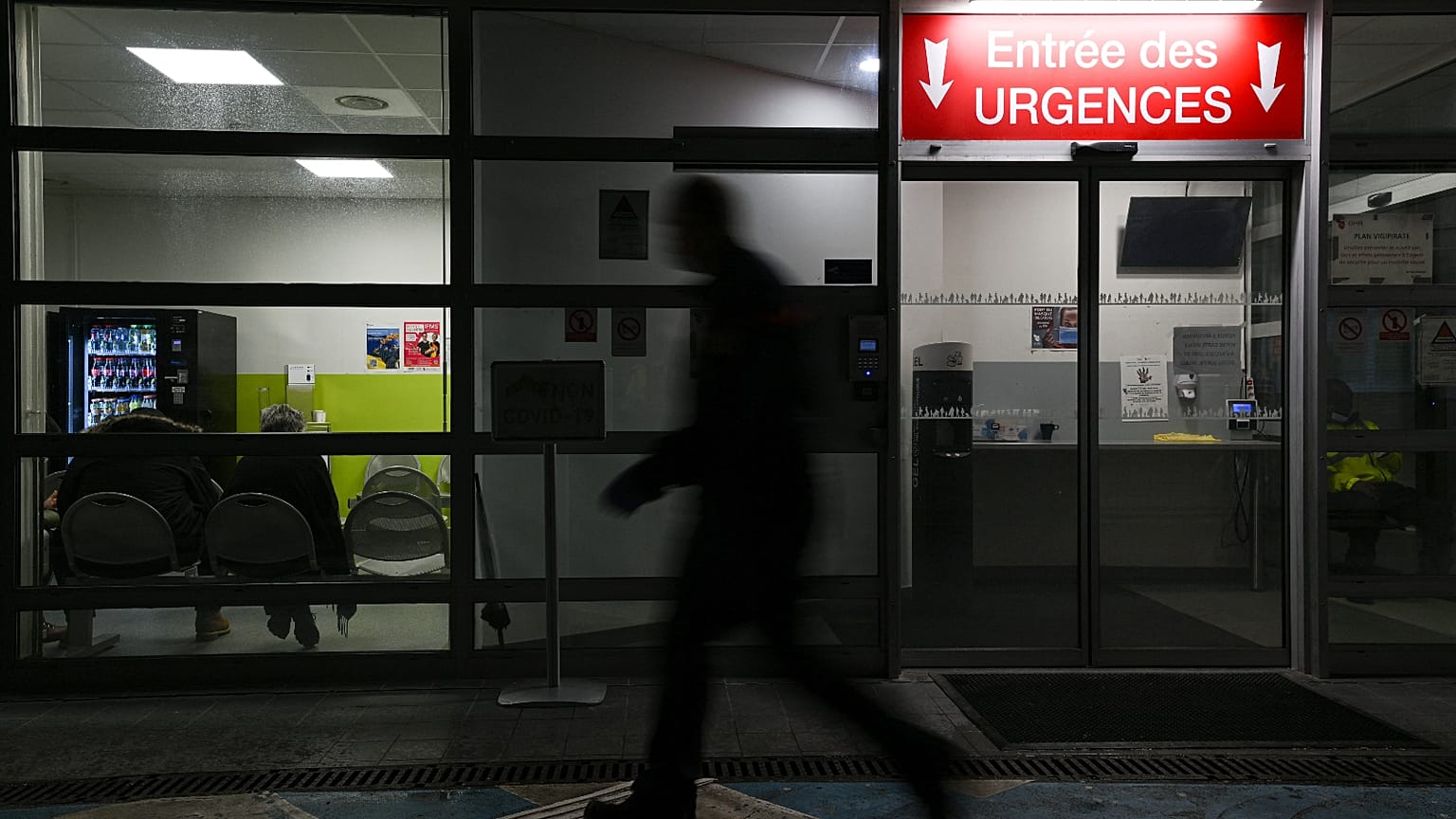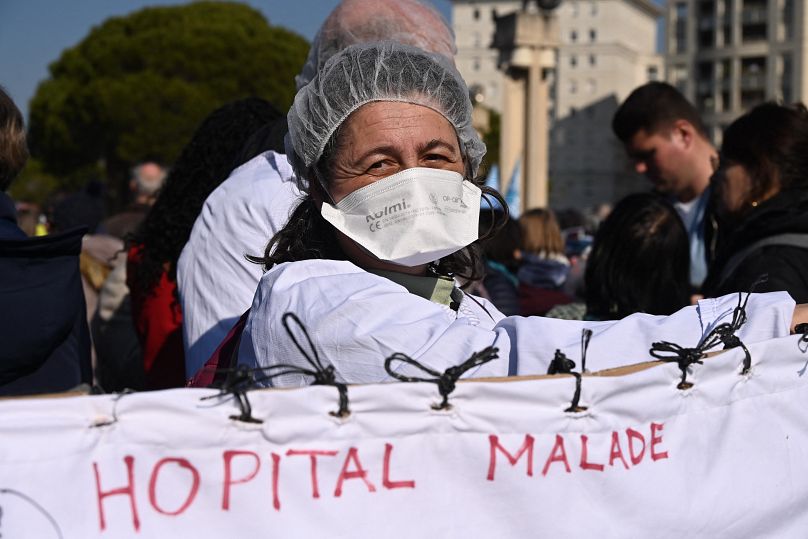For decades, France capped the number of medical students. Now there are fewer doctors and staff shortages in hospitals.
In one of France’s most rural regions, a mental health hospital is worried about filling the holes in its staffing schedule this summer.
 ADVERTISEMENT
ADVERTISEMENT
 ADVERTISEMENT
ADVERTISEMENT
Doctors have already been putting in extra shifts to cover for their colleagues and billing over time in order to plug the gaps, a scenario that is repeating itself across the country amid a chronic shortage of doctors.
“We have reduced the capacity of some services, specifically a clinic where the staff and beds have been cut in two,” said Anne Maron Simonet, deputy head of health operations at the Sainte-Marie Hospital Association in Rodez, France.
If the facility is running at all at the moment, “it’s thanks to our staff volunteering for overtime hours,” she added.
‘Daily struggle’
Some 200 km west of Rodez, in the Lot-et-Garonne region, the situation is eerily similar.
“General practice is in difficulty, but all specialities are in difficulty, and hospitals aren’t able to recruit doctors,” said Dr Jean-Marcel Mourgues, a GP in the region and vice president of the Conseil National de l’Ordre des Médecins [Order of Physicians], a national doctors’ body.
Long delays in treatment due to shortages, he added, can adversely impact patients.
One of his patients was treated for a stroke while visiting family in another region and when she came back to the Lot-et-Garonne, “it took several months to get appointments with speech therapists and eye health professionals” as needed for her recovery, he said.
“This is the daily struggle of our patients and doctors who remain in practice, not only to try to take new patients,” but also to make sure that there is no reduction in their care, he added.
A report published last month by the DREES, France’s social and health statistics department, found that two-thirds of GPs had to refuse new patients due to the demand. Last year, 78 per cent of GPs said that there were not enough doctors where they lived.
Some local hospitals in France have even had to close their overnight emergency services, noting that they don’t have enough staff to stay open.
Hospital administrators in Ardèche took to social mediato explain their decision to close overnight, stating that it was not a decision taken lightly.
Historical cap on medical students
The unequal distribution of doctors has long been a topic of debate in France, with much talk about areas without inadequate access to healthcare, dubbed so-called “medical deserts”.
The DREES has said it’s a term that refers to a “reality that is difficult to objectify” but that there have been “increased tensions” in areas that were already poorly served.
According to the figures from the Organisation for Economic Co-operation and Development (OECD), France has 3.4 doctors per 1,000 people. That’s fewer than in Germany, Ireland, Spain, Greece, and Italy, but slightly higher than in Hungary or Belgium.
But it’s also a number that is decreasing as medical professionals retire without enough new students to replace them.
This in part dates back to a cap on the number of students that could study to become doctors in France, something called the ‘numerus clausus’.
“[For decades,] the number of students was drastically reduced with the dreams of a generation of children who wanted to become doctors broken. And now we are paying the consequences,” Simonet said.
This cap was eventually changed in 2021 to create a minimum number of students that should be enrolled in medical studies. But another report from the DREES has predicted that the number of doctors will reach a low point in 2024 before slowly increasing.
Some argue that the shortages are impacting most of the country and that more needs to be done to increase the number of health workers.
“There are no longer zones that are overendowed with doctors,” said Arnaud Chiche, an anesthesiologist in northern France who founded an organisation called the Collectif Santé en Danger - or the Health in Danger Collective - in 2020.
“The name ‘numerus clausus’ was removed two years ago and has been replaced by the ‘numerus apertus’ [minimum enrollment], so the government says this will greatly increase the number of doctors. I can tell you that it will not increase them enough,” Chiche said.
“As GPs retire, it will get even worse in the years to come. It's true that training doctors takes time, but on the other hand, if we never start, we'll never see the end of the problem”.
Simonet added that since the COVID-19 pandemic, there has been a higher turnover.
“We have a lot of staff who have left the establishment, who are changing activities, and suddenly, that puts pressure on the staff and we can’t constantly replace people,” she said.
‘Missed opportunity’
Access to healthcare has been a topic of intense recent debate in France’s parliament, where multiple solutions have been considered but remain subject to fierce disagreements.
A new draft law was passed through the National Assembly, the lower house of parliament, earlier this month that aims to alleviate some of the issues.
The proposed law, which still needs to pass the Senate, would open up a social engagement contract for students in their second year of medical school to work in areas without enough doctors and would make it easier for foreign doctors to work in France.
It also would create a “referent nurse” position to help coordinate patient care and will automatically register health professionals as part of communities to “encourage caregivers to work with each other”.
Gustave Richard, from the Association of Small Towns in France (APVF), said that while some measures “go in the right direction,” the failure of one amendment in the parliament that would have made greater changes was a “missed opportunity”.
MPs from multiple political groups had proposed an amendment that aimed to better distribute doctors across the country by forcing them to receive authorisation from a regional health agency before practising in areas where there are enough doctors.
The amendment, opposed by many doctors and the government, was rejected.
Chiche argued that the attempt was one example of politicians trying to force medical doctors to work in a certain way instead of recruiting more doctors.
“If we don’t want any more medical deserts, we have to increase the number of trained doctors,” he said.
“We must stop having a logic of coercion because we actually lack doctors, and the few that are there, we would like to force them to work in a certain way”.
He argues, like the doctors’ trade unions, that in order to increase the profession’s attractivity, the government needs to increase the €25 consultation price so that GPs can hire people to handle administrative tasks.
Otherwise, he said, they need to get rid of the administrative hold-up that doesn’t exist in other countries.
“We need to simplify the practice of small town medicine and to do that we need to get rid of administrative charges. But that won’t happen with a snap of fingers,” he said.
Richard, meanwhile, said that everyone knows the situation is “not good and is deteriorating,” with local officials asked daily about it by constituents.
“The expectations are extremely high and the incentive measures [in the law], while they can play a role, are not enough,” he said.


















